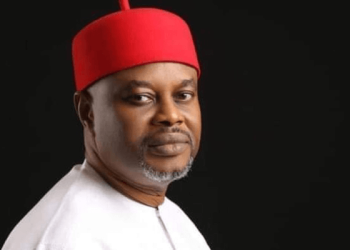If the Federal Government and organised labour fail to agree on a common ground, the nation may as from tomorrow retrogress to the condition it found itself on January 1, 2012, when it was locked down by angry citizens protesting the New Year gift former President Goodluck Jonathan’s government chastised them with.
That administration had jacked up the pump price of Premium Motor Spirit (PMS or petrol) from N65 to N141 per litre passed off as fuel subsidy removal; but eventually reduced it to N97 per litre following massive protests by citizens.
The government of President Muhammadu Buhari, in what it called the deregulation of the downstream oil sector about a week ago, had again jacked up the pump price of PMS from N86.50 to N145, claiming it was the only way to force down the high cost of the product sold for between N150 and N250 in most filling stations nationwide. The Minister of State for Petroleum, Dr. Ibe Kachikwu, said the FG had bountiful, mouth-watering social protection programmes in the 2016 budget to cushion the effects of the hike on Nigerians.
When the FG hiked the pump price of fuel in 2012, its major argument was that PMS was cheapest in the country even at N97 per litre, though statistics from other oil producing nations proved the contrary.
The Subsidy Reinvestment Programme (SUREP) which the FG embraced to pacify Nigerians on the January 1, 2012 fuel pump price increase ended up not scratching the problems of widespread poverty and youth unemployment, infrastructure deficit and citizens’ empowerment, among others, in the country. Worse still, hikes in the pump price of petrol come at a time when Nigerians are facing intense economic hardship, as is the case at present. Organised labour had consistently insisted that fuel subsidy removal would be injurious to ordinary Nigerians.
But the FG’s position had been that it benefitted the rich the more and encouraged the smuggling and selling at higher prices of petrol across the country’s borders. This situation was partly confirmed after the January 2012 nationwide fuel subsidy removal protests and the ensuing investigation by the House of Representatives which unravelled the heartless looting of the nation’s coffers by briefcase fuel importers and complicit oil sector managers in the name of fuel subsidy.
Again, ours has been a country where the cart is always placed before the horse in the implementation of public policies; a good example being the incessant increases in electricity tariff when power generation and supply are rare; or can be compared with spittle at best.
Four years after the first attempt to totally remove fuel subsidy failed, public expectation had been that the FG would invest energy and resources in bringing the nation’s four refineries back to life, facilitate the establishment of new refineries and ensure that pipelines for petroleum products’ distribution are not only in good shape, but are properly policed, so that the scarcity of fuel under a downstream sector deregulation regime can be averted. Unfortunately, none of such, including regular fuel supply at N145 per litre can be guaranteed up to this hour.
Yet the FG has purportedly ended the subsidy regime. It is not a surprise, therefore, that organised labour has told the FG to revert the pump price per litre to N86.50 from N145 or risk a nationwide workers’ strike. But extremely difficult as the latest hike may seem, it does appear the trillions of naira the government is lavishing on fuel subsidy yearin- year-out is not benefitting the Nigerian poor.It is not also sustainable in the light of the country’s present economic quagmire.
If truly premised on a sincere deregulation of the downstream sector to allow private investors to intervene in the short term by way of importing products to boost supply; and building refineries in the long term to grow local refining capacity, we think Nigerians should give the latest FG initiative a trial.
The competition that would be unleashed by truly deregulating the downstream oil sector would crash the pump price of fuel in no distant time. If, however, the measure is yet another ploy by the FG to fleece and fool Nigerians without genuinely deregulating the sector, the result would also show anytime soonest.
This being so, the Buhari government would have stringed the rope with which to hang itself, since there is always a pay-back time; and 2019 is not too far to pay back the ruling All Progressives Congress in its own coin that election year should the purported deregulation that has pushed the pump price of fuel to the roof-top turn out to be yet another art in perfidy.













































